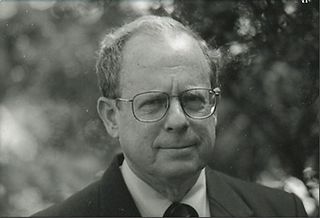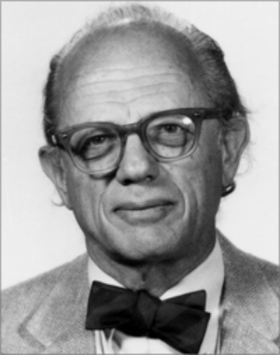
Andrei Dmitrievich Sakharov was a Soviet nuclear physicist, dissident, nobel laureate and activist for nuclear disarmament, peace, and human rights.

The Pugwash Conferences on Science and World Affairs is an international organization that brings together scholars and public figures to work toward reducing the danger of armed conflict and to seek solutions to global security threats. It was founded in 1957 by Joseph Rotblat and Bertrand Russell in Pugwash, Nova Scotia, Canada, following the release of the Russell–Einstein Manifesto in 1955.

Yulii Borisovich Khariton, also known as YuB,, PhD, was a Russian physicist who was a leading scientist in the former Soviet Union's program of nuclear weapons.

Yuri Fyodorovich Orlov was a particle accelerator physicist, human rights activist, Soviet dissident, founder of the Moscow Helsinki Group, a founding member of the Soviet Amnesty International group, and Professor of Physics at Cornell University. He was declared a prisoner of conscience while serving nine years in prison and internal exile for monitoring the Helsinki human rights accords as a founder of the human rights movement in the Soviet Union.

Jeremy J. Stone was an American scientist who was president of the Federation of American Scientists from 1970 to 2000, where he led that organization's advocacy initiatives in arms control, human rights, and foreign policy. In 2000, he was succeeded as president by Henry Kelly. Stone continued his work at a new organization called Catalytic Diplomacy. Stone was the son of the journalist I. F. Stone.

Herman Feshbach was an American physicist. He was an Institute Professor Emeritus of physics at MIT. Feshbach is best known for Feshbach resonance and for writing, with Philip M. Morse, Methods of Theoretical Physics.
The Andrei Sakharov Prize is a prize that is to be awarded every second year by the American Physical Society since 2006. The recipients are chosen for "outstanding leadership and/or achievements of scientists in upholding human rights". The prize is named after Andrei Sakharov (1921-1989), Soviet nuclear physicist, dissident and human rights activist; since 2007 it has been valued at $10,000.
Kurt Gottfried was an Austrian-born American physicist who was professor emeritus of physics at Cornell University. He was known for his work in the areas of quantum mechanics and particle physics and was also a co-founder with Henry Way Kendall of the Union of Concerned Scientists. He wrote extensively in the areas of physics and arms control.

Roman Grigorievich Maev , is a Canadian professor of physics at the University of Windsor, distinguished university professor, the Foreign Member of the Russian Academy of Sciences (RAS) (2019), full professor in physics (2005), Dr. Sc. (2002), Ph. D. (1973). Dr. Maev is the founding director of the Institute for Diagnostic Imaging Research at the University of Windsor.
The Committee on Human Rights in the USSR was founded in 1970 by dissident Valery Chalidze together with Andrei Sakharov and Andrei Tverdokhlebov.
Andrei Nikolayevich Tverdokhlebov was a Soviet physicist, dissident and human rights activist. In 1970, he founded - along with Valery Chalidze and Andrei Sakharov - the Committee on Human Rights in the USSR. In 1973, Tverdokhlebov - along with Valentin Turchin - founded the first chapter of Amnesty International in the Soviet Union. He also helped found Group 73, a human rights organization that helped political prisoners in the Soviet Union. He was the author/editor of several samizdat publications while in the Soviet Union, which were compiled in the book, "In Defense of Human Rights", published by Khronika Press, New York, in 1975.

Herman Winick is an American scientist and Professor Emeritus at the Stanford Linear Accelerator Center (SLAC) and the Applied Physics Department of Stanford University.
Yuri Nikolayevich Babayev, k.N, was a Soviet physicist who spent a long career in the former Soviet program of nuclear weapons, and known as one of the principles who designed the Tsar Bomba, the largest-ever nuclear weapon.
Joseph Leon Birman was an American theoretical solid-state physicist.

Mikhail Yevgenyevich Shaposhnikov is a Soviet-born Swiss theoretical physicist and a professor at École Polytechnique Fédérale de Lausanne (EPFL). He is active in the fields of cosmology and particle physics.








